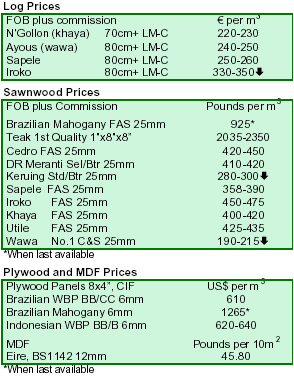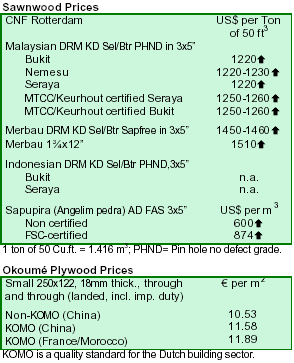|
Report
from the UK
Dollar
Exchange Rates of 23th March 2006
EU EURO 0.839
DIY market weakens as housing market recovers
The weakest DIY market in 10 years has seen B&Q¡¯s parent company Kingfisher posting a drop of 33% in
profits while retail profits at B&Q fell 52%. The CEO said that the UK market continued to weaken but strong
performance in Europe and Asia had helped overall earnings.
The housing market recovery gathered pace in February according to the latest survey by the Royal Institute of
Chartered Surveyors (RICS). RICS found that 17% more of its estate agent members in England and Wales
reported house price rises as opposed those that reported a fall. This was the widest differential since June 2004.
RICS added that the improvement was centred on London where 49% agents reported price increases. This
was also confirmed by the Office of the Deputy Prime
Minister wh ich indicated that new mortgages loans showed prices rising by 4.3% in the 12 months to
January. Wolseley, a building and plumbing supplier, has announced a 16% rise in half-year profits as growth in
the USA offset difficult UK trading conditions.
CBI foresees job losses in manufacturing sector
The Confederation of British Industry (CBI) forecast that jobs will continue to be lost in manufacturing firms over
the next few years as the economy picks up gradually. The business group said it believes other sectors will see
some rise in employment but not enough to reverse recent increases in the jobless total. CBI analysts expect
consumer spending to remain subdued due to modest growth and rising energy bills. Unemployment rose by
14,000 in February, the highest figure since December
1992. According to the Office of National Statistics, the Consumer price index (CPI) rose to 2% in February
while the headline rate which included mortgages remained unchanged at 2.4%. The FTSE index rose
above the 6,000 mark for the first time in 5 years in mid -March, before retreating. Analysts attributed this to profit
taking as the financial year closes on 6 April.

Report
from the Netherlands
Holland represents EU in FLEGT talks with Malaysia
The European Agriculture and Fishery Council (EAFC) has issued a mandate to the European Commission (EC)
to negotiate terms with possible FLEGT -countries (FLEGT: Forest Law Enforcement, Governance and
Trade) supplying timber to the EU. Since the Netherlands is, by far, EU¡¯s largest importer of
Malaysian graded sawnwood, it has been commissioned to negotiate terms with Malaysia on behalf of the
EU. The Netherlands has traditionally been very active in the trade of ¡®green timber¡¯ since the early 1990s through the
Covenant on tropical hardwood, Keurhout and timber certification schemes. To facilitate the negotiations with
the Malaysian government, a Dutch expert will be
stationed at the EC Mission in Kuala Lumpur.
Market sentiment rises amid worries over stocks
Dutch trade in various tropical species such as dark red meranti (DRM), sapelli and sapupira, is reported as quite
active. Some importers report increasing inquiries, particularly for DRM rough and (semi-) finished
sawnwood. Trade is, however, restricted to parcels now afloat or from stock. Although traders are pleased that
their stocks are bearing fruit and valued again, the prospects for quick replenishment are not
favourable.
The precarious supply situations in Brazil and Malaysia are still worrying while supply from Africa is at its peak,
with hardly any room for further volume advances . It is increasingly felt that exporters and sawmillers in
Malaysia are receiving diminishing amount of logs, in smaller dimensions and, thus, less recovery. Well known
producers/exporters such as Mentakab Sawmill Sdn. Bhd. have stopped production temporarily due to lack of
logs. The sharp reduction in production has had several
consequences: no recovery items such as shorts and less accumulation items such as 2.1/2x3¡± scantlings or strips.
Furthermore, since Malaysian sawmills do not supply enough strips, moulding plants, in turn, face problems
finding raw materials for production and exports to the Netherlands of items such as glass beads, skirting boards
and architraves, among others.
Mills find tough competition from overseas buyers
This situation is not restricted to Peninsular Malaysia. Many sawmills in Sabah complain of lack of materials.
Loggers prefer to sell abroad in swift deals with timber hungry countries such as China and India rather than
supplying domestic sawmills. Plymills , which sometimes are in a better position than sawmills to pay higher
prices, benefit from logs coming their way. Some reports point to a stark contrast between the scarcity of logs in
the country and the relatively high volume of Malaysian
logs available in China. This ultimately results in CNF Rotterdam prices of DRM timber products reaching
record-breaking levels.
Exporters avoid quotations till situation stabilizes
As sawmillers are busy coping with existing orders, exporters in Malaysia are increasingly prudent and
hesitant in accepting further orders from overseas clients. In an almost concerted action, exporters are refraining
from bringing out fresh quotations until the situation stabilizes. Price-developments have been brisk but it is
uncertain whether buyers are willing to absorb further price increases. In these
circumstances, some importers are not pushing for fresh quotations. It remains to be seen
how the situation will further develop and whether the current optimistic market trend for hardwood will persist
in April.
Two other factors are contributing to price increases of Malaysian hardwood in the Netherlands. Firstly, ocean
freight is expected to be raised again in early April. Secondly, the Malaysian ringgit (MR) has strengthened
from the previously pegged level of 3.8 MR to 3.69 MR per US$. Both factors have a noticeable effect on CNF
Rotterdam price levels of sailing cargo and fresh offers. Two other factors are contributing to price increases of
Malaysian hardwood in the Netherlands. Firstly, ocean
freight is expected to be raised again in early April. Secondly, the Malaysian ringgit (MR) has strengthened
from the previously pegged level of 3.8 MR to 3.69 MR per US$. Both factors have a noticeable effect on CNF
Rotterdam price levels of sailing cargo and fresh offers.
 ¡¡ ¡¡
|